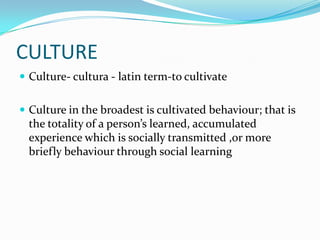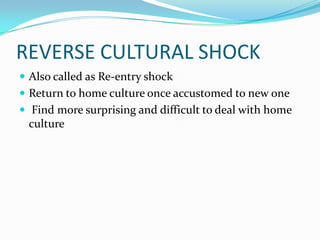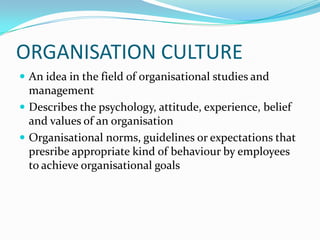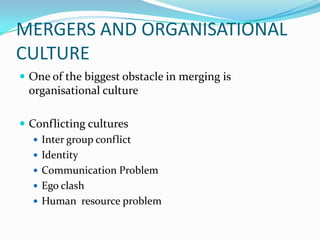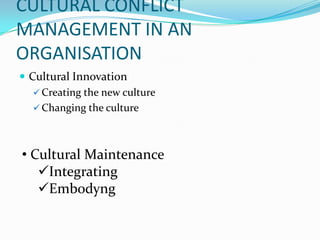Cultural shock ppt
- 2. CULTURECulture- cultura - latin term-to cultivateCulture in the broadest is cultivated behaviour; that is the totality of a person’s learned, accumulated experience which is socially transmitted ,or more briefly behaviour through social learning
- 3. CULTURAL SHOCKThe difficulty have adjusting to new culture people had different markedly from their own.Emotional and physical discomfort that person feels while moving to new environment
- 4. SYMPTOMS OF CULTURAL SHOCKSymptomsIsolation and frustrationSleeping a lotNervousnessHome sicknessCryingOther symptoms
- 5. PHASES OF CULTURAL SHOCKHoneymoon Phase - FunNegotiation Phase - FlightAdjustment Phase - FightMastery Phase - Fit
- 6. REVERSE CULTURAL SHOCKAlso called as Re-entry shockReturn to home culture once accustomed to new one Find more surprising and difficult to deal with home culture
- 7. COPING UP WITH CULTURAL SHOCKTake care of yourselfReduce uncertaintyGet away from it allReduce demandsAssume controlFinish unfinished businessTake advantage of your environment
- 8. CULTURAL CLUSTERSBased on similarities in cultural values and belief globe researcher have divided the participating societies into different cultural clusters. Some of them are:Latin EuropeSouthern AsiaLatin AmericaArab cultures
- 9. ORGANISATION CULTUREAn idea in the field of organisational studies and managementDescribes the psychology, attitude, experience, belief and values of an organisationOrganisational norms, guidelines or expectations that presribe appropriate kind of behaviour by employees to achieve organisational goals
- 10. MERGERS AND ORGANISATIONAL CULTUREOne of the biggest obstacle in merging is organisational cultureConflicting culturesInter group conflictIdentityCommunication ProblemEgo clashHuman resource problem
- 11. CULTURAL CONFLICT MANAGEMENT IN AN ORGANISATIONCultural InnovationCreating the new culture
- 14. Integrating
- 15. EmbodyngCOPING WITH ORGANISATIONAL CULTURAL SHOCKTrainingOrganizational developmentPerformance feedback and counsellingSystem development and researchOrganisational context
- 16. Example

